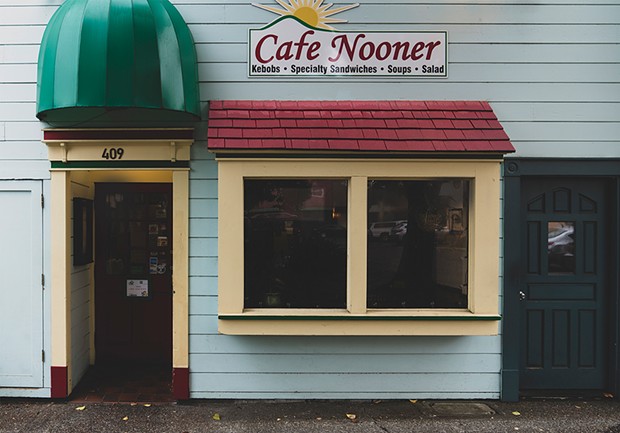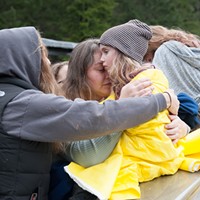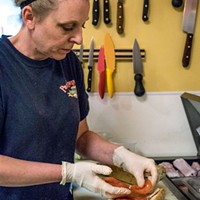When Restaurants Go Dark
Planned blackouts cost local eateries and their workers
By Jennifer Fumiko Cahill [email protected] @jfumikocahill[
{
"name": "Top Stories Video Pair",
"insertPoint": "7",
"component": "17087298",
"parentWrapperClass": "fdn-ads-inline-content-block",
"requiredCountToDisplay": "1"
}
]
It hasn't been an easy year for restaurants in Humboldt County. Ask managers and owners how it's going and you'll likely hear that profits are down in the already risky business. Plenty of them will tell you the tightened margins of legal cannabis is part of it but pretty much all of them will also say it's a bad time for Pacific Gas & Electric's planned blackouts.
Joe Filgas, who has co-owned Café Nooner and Café Nooner Too with his wife, Lorrena, says, "This has been by far the most financially devastating thing we've experienced in this business."
When PG&E announced Humboldt County was going dark in six hours on Oct. 8, Joe Filgas, who's semi-retired and handles the restaurant's marketing, saw it on social media. He immediately alerted his wife, who sprang into action hunting down ice and cramming "all the expensive proteins" into the freezer. The 28-hour outage was mercifully short and, despite the short notice, Filgas says, "In terms of the expensive food, all of that was saved, it stayed plenty cold." The already prepped food that couldn't be stored still came to roughly $500 in lost inventory. Neither restaurant has a huge freezer and most of what the kitchen uses is purchased daily, so the advance warning of a couple of days before the Oct. 26 outage allowed them to scale back stock, make ice and cancel a delivery, leading to far less food wasted.
The bigger hit came in lost revenue, which Filgas estimates brings the total loss up to $6,000 for the Oct. 8 outage. Café Nooner Too opened up for a few hours on Oct. 9 to serve coffee and a little breakfast cooked on gas burners, though without the electric ventilation not much more was possible. But the Old Town location was completely shut down. He estimates the loss at about $6,000 for the day. As for insurance, he says, "At this point they do not cover anything at all from this because it's man made," and it's unclear whether that will change in the face of repeated blackouts.
Of the day's earnings, some $2,000 would have gone to wages for all the kitchen and waitstaff who were scheduled for the day. When the restaurant is closed, staff, many of whom rely on cash tips, don't get paid. "We're not large enough to support that," Filgas says.
On Oct. 29, in anticipation of the blackout that never came, Filgas says he and his wife rolled the dice and opened in Old Town with a limited supply for cash-only sales. "We basically sold everything we had," he says, adding that not losing power that night meant frenzied shopping to stock up and open the next day. "It's really a game of logistics and so many things have to come together perfectly just to open on a regular day." Not opening, he says, means a guaranteed loss. "I feel for the people that didn't open."
Along with her morning radio show on 96.3 FM, Talvi Fried juggles a handful of catering and bartending gigs. The Oct. 8 shutdown canceled a luncheon she was set to work. Two weeks later, the Oct. 26 blackout crossed out a scheduled bartending gig, followed by a catering event postponed in anticipation of the planned Oct. 29 outage that never materialized. Fried still manages to laugh over the phone as she says, "Definitely was a little below my expected income this month, that was for sure." It's difficult for her to estimate the money she's out, given the fluctuation in hours and tips from event to event, but she thinks $300 is in the ballpark — enough to get her back on her old instant ramen habit for a while and "motivate" her to look for more work. "I kind of feel bad for the back of house crew," she says, since they often make less on a given shift.
"Kitchen and waitstaff are struggling and, quite frankly, so are we," writes Meredith Maier, owner of Six Rivers Brewery, in a message to the Journal. Even if staff are clocking in, fewer customers means fewer tips. Despite staying open during the weekend of Oct. 26, she says, "We were hit hard on Saturday, one of our biggest weekends of the year usually, we were down almost 50 percent of usual Saturday before Halloween revenue." She added that while Sunday picked up since the restaurant was able to hook up a generator to show football and bring in fans whose power was out at home, the remainder of the week was "dismal."
After the Oct. 8 blackout, Christine Silver got serious planning for her three businesses, Sixth & E Neighborhood Eatery, Humboldt Soup Co. and Delish on 5th. The first outage cost her two days' revenue at each location and what she estimates as 25 percent of her inventory, including cooked and prepped foods from the Humboldt Soup Co., where staff do 12 hours of prep per day, and the largely imported specialty meats and cheeses at Delish on 5th. Even at around $11,000 in losses, it could have been worse. "Had I lost [the rest], I could have been under for four or five days" in terms of both stock and labor, unable to open with no food to sell.
"After that one, I started preparing," says Silver. The generator and fuel she bought to power the walk-in refrigeration at Humboldt Soup Co. turned out to be incompatible with the electrical setup there but did work at Sixth & E, which opened during the Oct. 26 shutdown.
Silver's other two restaurants (and their kitchen staffs) each lost a day's revenue. Though this time, with more warning, she was able to cram 200 pounds of ice in her walk-in, which stayed frozen, and only tossed around $4,000 worth of food. Still, she's skeptical it would have worked out in summer. "If my freezers didn't hold and if I'd lost all my inventory," she says, "I don't know if I would have been able to recover." Losses that big, she says, can close a restaurant for good and leave its staff out of work.
"Summer is terrifying, knowing that this is probably going to happen," Silver says of the planned shutdowns that PG&E has warned will be our new normal. Now that Sixth & E is blackout ready, she's focused on powering her cold storage, but it's not enough for true peace of mind. "How do we protect Humboldt in the future? That's what I want to ask," she says. "We're basically sitting ducks."
Jennifer Fumiko Cahill is the arts and features editor at the Journal and prefers she/her. Reach her at 442-1400, extension 320, or [email protected]. Follow her on Twitter @JFumikoCahill.
Speaking of...
-

On the Jamwagon Bandwagon
Apr 3, 2024 -

Mexican Breakfast, Elections and Updates
Mar 8, 2024 -

Pets, Dam Removal, Jacobs Update and Cozy Cafes
Feb 24, 2024 - More »
Comments (2)
Showing 1-2 of 2
more from the author
-
Eco Cemeteries, Flags, Impacts and Foods
- Apr 12, 2024
-
Sunken Seaweed's Dual Mission
Stocking shelves and the ocean with seaweed and kelp
- Apr 11, 2024
-
Alternative Energy Brainstorming with Billionaires
- Apr 11, 2024
- More »




































